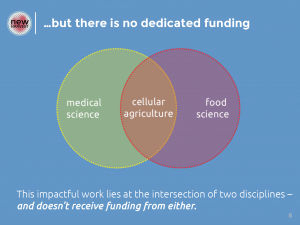We are thrilled to share that Tufts University has won a $10 million grant from the USDA’s National Institute of Food and Agriculture (NIFA) to establish a National Institute for Cellular Agriculture.
Tuft’s National Institute for Cellular Agriculture will be a research center of excellence focused on developing a cell-grown meat platform and training the next generation of industry leaders and professionals.
The team, led by David Kaplan, the Stern Family Professor of Engineering, and his team of graduate students, will combine the efforts of engineers, biologists, nutrition researchers, and social scientists at Tufts and other universities, all in an effort to enhance food sustainability, nutrition, and security.
Check out this interview with David Kaplan and Tufts about the newly funded institute.
Why is this a big deal?
For New Harvest, Tufts’ big win was seeing our thesis become reality.
Catalytic Funding
When we started funding Natalie Rubio, our first researcher in the Kaplan Lab at Tufts University, in 2016, our thesis was simple: If New Harvest takes the leap and funds cultured meat research, then we can generate the data and expertise to win big time government grants.
- Slides from our 2015 fundraising deck!
Since 2016, the Kaplan Lab has been our biggest investment in a single laboratory. With just under $1M, we supported six New Harvest grantees growing cell-cultured caterpillar steaks, fat, and nutritionally engineered beef. Along with their incredible Principal Investigator, Dr. David Kaplan, those grantees multiplied that initial funding ten fold.

Our thesis was validated with this recent $10m grant. Not only has the USDA acknowledged cellular agriculture via this grant, it has also established cellular agriculture as a discipline worthy of dedicated institutes.
This is a dream for New Harvest’s donors, who saw their contributions have 10X the impact with a single government grant.
Our grants to the Kaplan Lab were among the first we ever made and took five years to “pay off.” We have every reason to believe that this success will be the first of many.



